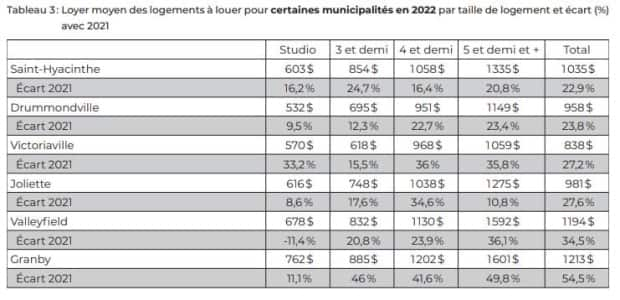Soaring rents in Quebec significantly underestimated by official data, study finds

A tenants' rights group based in Montreal is calling for urgent action from the provincial government after conducting a study that found the price of rent in Quebec to be increasing at a significant pace — a phenomenon that is drastically underrepresented by federal data.
For a third consecutive year, the Regroupement des Comités Logements et Associations de Tenants du Québec (RCLALQ) looked at rental listings in the run up to Moving Day. This year's study analyzed more than 51,000 rental listings posted on the website Kijiji between February 4, 2022 and May 31, 2022.
Its study found that apartments that were on the market were, on average, 49 per cent more expensive than the average rent listed by the Canada Mortgage and Housing Corporation (CMHC). That gap has grown over the last three years.
The CMHC's annual report only compiles the average rent of tenants who are currently occupying a unit, including those who have not moved in several years. It doesn't take into account the rents being asked for units that are available on the market — usually priced much higher, according to the study.

People who can stay in their apartments can save a lot of money.
"People who are not moving are paying, on average, 50 per cent less than the people who are moving this year," said Martin Blanchard, a housing advocate and spokesperson for the RCLALQ.
"That's $427 more that people will pay than other renters who stay in their apartment."
According to the RCLALQ's study, the average rent for a four and a half Quebec dwelling was going for $1,316 on Kijiji. According to CMHC data, the same unit that is occupied costs its current tenant $892.
According to the RCLALQ, the data indicates there is a serious problem of illegal rent increases between tenant changes.

"The law says that you cannot increase the rent of an apartment between two tenants … but the law is inapplicable," said Blanchard. He said the way it's structured under Quebec's administrative housing tribunal (TAL) makes it impossible to verify that the rent is staying the same between a change of tenants.
"The law has no teeth. So landlords say, 'hey, I can charge $400, $500 to $1000 more. I will do it.'"
Blanchard said worst of all, landlords are kicking their tenants out so they can take advantage of this situation.
"So this is why we're seeing renovictions," he said, describing the practice of kicking out tenants, making renovations and then jacking up rents for those who move in.
The CMHC did not respond to an interview request.
WATCH | Montreal renters ousted by landlords looking for larger rent increases:
Regions hit hardest
Blanchard says the figures recorded in the study are "staggering." According to the findings, the price of rent has increased on average by nine per cent across Quebec, now sitting at an average of $1,300 per dwelling across all unit sizes.
Moreover, the study shows that the highest increases in rent occurred in cities and regions outside of the major urban centres such as Montreal and Quebec City.
On Montreal's north shore, rents increased by 20 per cent on average in the last year. The average rent for a unit now goes for $1,400.
Granby, Que., is the most affected, according to RCLALQ's data, where rents went up 54.5 per cent in the last year to reach an average of $1,213.

Blanchard says this is "very troubling," because people who used to look to Quebec's regions to find available and affordable housing now have nowhere to turn.
"Our findings show that this year, there's no affordable apartment anywhere in Quebec," he said.
The study found the explosion in rent to be closely linked to the low vacancy rates in Quebec, which are hovering around 0.5 per cent or less in some regions.
"Not only are there no affordable apartments, but there's no apartments at all in many regions of Quebec right now," Blanchard said.
Demand for rent control, provincewide rental registry
Faced with a rental market that the RCLALQ describes as completely out of control, the group is calling on the Quebec government to introduce measures that have concrete and proven effects to control rent.
This includes creating a rent registry which must be "public, universal and free of charge in order to allow tenants to check the amount of the old rent."
A rent register would make it possible to better protect tenants against rent increases, but also against the eviction of "unscrupulous" landlords, since landlords would have a tougher time increasing the rents of a newly acquired building, the RCLALQ says.
Another measure is introducing mandatory rent control. To achieve this, the group proposes making it mandatory for landlords to comply with the average rent increase issued annually by the TAL. Currently, these rates are only recommendations.
"Only 0.5 per cent of apartments are controlled. There is no rent control in Quebec right now," Blanchard said,
Blanchard said the Quebec government must implement these demands quickly, but says so far, "the government of Quebec has been totally deaf to all our demands."
A spokesperson for Quebec Minister of Municipal Affairs and Housing Andrée Laforest said a record amount has been set aside this year to assist with housing: $75.8 million in housing assistance and another $2 million for municipalities to help their local residents in need of a hand.
Laforest, who acknowledged the existence of a housing shortage in the spring, has rejected the idea of a rent registry.
The ministry says nobody should end up in the street, and the way to prevent that is to call and ask for help.
If someone is still looking for housing, they can contact their local housing office or the Société d'habitation du Québec at 1 800-463-4315.


